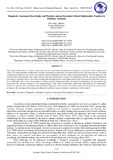| dc.contributor.author | Mjenda, Marcellina | |
| dc.contributor.author | Mutarutinya, Vedaste | |
| dc.contributor.author | Owiti, Dickson | |
| dc.date.accessioned | 2023-12-07T15:08:05Z | |
| dc.date.available | 2023-12-07T15:08:05Z | |
| dc.date.issued | 2023-11-15 | |
| dc.identifier.uri | http://ir-library.mmust.ac.ke:8080/xmlui/handle/123456789/2468 | |
| dc.description.abstract | This study examined how secondary mathematics teachers understand and implement diagnostic assessments in their mathematics classes. To understand how mathematics teachers conceptualize diagnostic assessment and how they put it into practice, the study conducted in-depth interviews with 20 secondary school mathematics teachers using a phenomenography research approach and analyzed them thematically. The results showed that most mathematics teachers are unfamiliar with the concept of diagnostic assessment, misunderstand its role in the teaching and learning process, and refrain from using it because they don't know how to do so efficiently. Due to the overcrowding in classes and the widespread failure of national examinations, the few people who understood the concept admitted to not implementing it. The study recommends professional development for mathematics teachers to improve their conceptual understanding of diagnostic assessment as well as their capacity to integrate it in classrooms to improve the teaching and learning of mathematics and hence improve students' performance in the subject. | en_US |
| dc.language.iso | en | en_US |
| dc.publisher | AFRICAN JOURNAL OF EMPIRICAL RESEARCH | en_US |
| dc.subject | Diagnostic, Assessment, Knowledge, Practices, Secondary, School, Mathematics, Teachers, | en_US |
| dc.title | Diagnostic Assessment Knowledge and Practices among Secondary School Mathematics Teachers in Dodoma, Tanzania | en_US |
| dc.type | Article | en_US |

